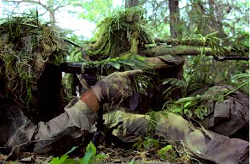Gun Control
 One of my friends enlisted in the Air Force after high school.
One of my friends enlisted in the Air Force after high school.
After a few years in the Military Police (not the most prestigious job), he became a counter-sniper.
He served on tours in the Middle East and Africa, and was internationally ranked in military sniper competitions.
He left the service to attend college, and to make a little money on the side he would teach people how to shoot handguns and rifles.
The customer would hear about his combat experience and awards-- and they would get really pumped as they were ready to go fire off some rounds at the shooting range.
 But they always left the first day disappointed.
But they always left the first day disappointed.
When my friend teaches someone how to shoot, they spend the entire first day at the range without shooting a single round.
Instead, they take the next few hours assembling and breaking down the rifle, cleaning the rifle, and learning about all the potential hazards you have with shooting.
Although not as dangerous, trading should be viewed in the same light.
And yet when I talk to new traders about defining systems and managing risk, they get disappointed.
They want the magic bullet, the magic system-- the path to financial freedom.

Look, I get it.
Trading is suppsoed to be fun and exciting, with all these flashing red and green lights, you sitting at your 4-monitor helm as the Master and Commander of the financial landscape.
But success does not come with that mindset.
You first need to sit down and break down your gun.
You need to know where the safety is.
You must learn not to shoot yourself in the foot.
Risk Management 101

Now when I was in college, I was the president of my fraternity. It was the best time of my life I never want to do again.
The idea of a fraternity is to get a group of unsupervised young men all under the same roof and feed them alcohol.
What a bright idea.
As president I learned that I was criminally and financially responsible for whatever happened on our property.
Not a fun situation.
You can try all you want to stop bad things- you can say no booze in the house, no drinking on campus, no partying at apartments, don't go out to bars... for a party college, it's not feasible.
I learned that the goal was not Risk Elimination, it was Risk Management.
The name of the game was to have fun under well constructed parameters so nobody did anything stupid.
Sounds like trading, right?
If you are looking to eliminate 100% of the risk in your trading, you will not have any success. Have fun pulling your annualized 1% out of your FDIC-insured money market account.
Winning the Game Comes Through Risk Management.
It's about maximizing rewards under well constructed parameters so nothing stupid happens to your trading account.
This is not just about stops. There are a ton of risks traders don't see coming, and it goes back to understanding how you interact with your systems.
Let's take a look at a few risks that need to be managed.
Directional risk. If you're coming from equity world, you should be used to hearing this by now. And if you don't have your risk planned beforehand you will not succeed. It can go further than that-- if your risk is too tight, you can often get whipsawed out of a position only to see it go back in your favor again.
Extrinsic risk. This is a fancy way of saying that there are other risks in trading options. These risks go outside the realm of directional risk and relate to the extrinsic value of options. My option training course goes into these risks much more in-depth and you learn how to play the options game.
Opportunity risk. Let's say you get stuck in a losing trade and spend a good amount of time working your way out of the position. During that time, there may have been much better trading opportunities you missed because your attention was focused elsewhere.
Structure risk. This is rarely discussed, because it normally is the result of a winning trade. If a trade you put on was very successful, why didn't you have on more size? If you sold a put option and the stock rips higher, why didn't you buy a call? Not an easy set of risks to account for.
Psychological risk. The risks involved in this area need much more than a paragraph to explain what's going on. A major risk to your systems underperforming is your perception on the success of that system.
As you start to define these risks, think about how best these risks can be managed.
Hopefully you've figured this out by now-- risk management is the main component of a trading system.
So you can go out and argue about why trading a certain indicator is better than another, or why momentum trading never works or why this "guru" is better than another.
But 80% of trading success comes from knowing and defining the risks and developing contingencies in your system to manage these risks.
In the next Trading Success Plan, you will see the methods needed to define the setups in your system and how to develop a profitable system.